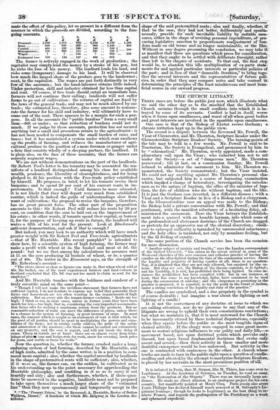THE CHURCH LITIGANT.
THREE cases are before the public just now, which illustrate what we said the other day as to the mischief that the Established Church sustains through the smell conflicts into which it is be- trayed by some of its servants. Conflict is bad in itself, worse when it turns upon. smallnesses, and worst of all when great bodies and great interests are involved in the squabble upon smallnesses.
One case is that of the Bishop of Exeter versus Gorham; a chronic irritation kept up in the public view.
The second is a dispute between the Reverend Mr. Powell, the Vicar of Cirencester and Mr. Thornton, Scripture Reader under the Gloucestershire Scripture Readers' Society. The turning-points of the tale may be told in a few words. Mr. Powell is said to be Tractarian the Sooiety is Evangelical, and pronounced by himto be " schislaticaL" Mr. Thornton, newly appointed, mall a com- plimentary call upon the Vicar; who exhorted him not to act under the Society—a set of "dangerous men." Mr. Thornton persevered ; till at last, on a communion Sunday. Mr. Powell refused to administer the sacrament to him. Mr. Thornton re- monstrated, the Society remonstrated ; but the Vicar insisted. He could not say anything against Mr. Thornton's personal cha- racter' but subjected him to a course of harassing examination which implied a charge of heterodoxy, investigating the catechu- men as to the nature of baptism, the office of the minister of bap- tism, the fate of children who die without baptism, and the like. It is just the Gorham case inverted, in a • different diocese ; with a Vicar and a Scripture Reader in lieu of a Bishop mid a clergyman. In the Gloucestershire case an appeal was made to the Bishop; the Bishop held a. private conversation with Mr. Powell; and that gentleman, with the manifest reluctance of a, hesitating delay, ad- ministered the sacrament Here the Vicar betrays the Establish- ment into a quarrel with an humble lay-man, into which some of the profoundest and abstrusest doctrines of the Church are dragged as pretexts for an oppressive use of the clerical discretion; obedi- ence to episcopal authority is tarnished by unconcealed reluctance; and the holy office is tarnished, not only by mundane feeling, but by the ill feeling of enmity.
The same portion of the Church service has been the occasion for more dissension.
"Another subject of anxiety and trouble," says the London correspondent of the Oxford Chronicle, "bus arisen in the recent revival in some of the West-end churches of the once -common and orthodox' practice of having the candles- on the altar lighted during the time of the communion service. About the legality and propriety of having candles at all, there is no question. Nay, it is admitted that they are not only allowed, but enjoined by the ca- nons. But they are not, the Bishop of the diocese contends, to be lighted; and his Lordslup, it is said, has prohibited their being lighted. In ,sine in-, stances the prohibition has been complied with; but in one instance at. least, that has come to my lmowledge, lights have continued to be used during the communion at mid-day; and the clergyman so persisting in the practice is prepared, it is reported, to try the point in the Court of Arches, under a strong conviction of the legality and duty of the practice."
The candles are symbolical, a.nd a due propriety in the symbol is of course desirable ; but imagine a war about the lighting or not lighting of a candle !
It is not the correctness of any doctrine at issue to which we are calling attention, nor do we presume to say that any of the litigants are wrong to uphold their own conscientious convictions ; but what we maintain is, that it is most untoward for the Church to be incessantly stirred by these technical disputations, especially when they appear before the public as the most tangible signs of clerical activity. If the clergy were engaged in some great move- ment to restore religions influences to our .polity and daily life,—a movement based, not upon doctrinal pomts which provoke only discord, but upon broad fundamental doctrines that evoke only assent and accord,—then their activity in these smaller and more doubtful enterprises would be less untoward. But activity in the one is contrasted with supineness in the other. A church whose truths are made to turn in the public sight upon a question of candle- snuffing and attestedby the attempt to martyrize Scripture Readers, is placed by her servants in the most -precarious position of all.


























 Previous page
Previous page